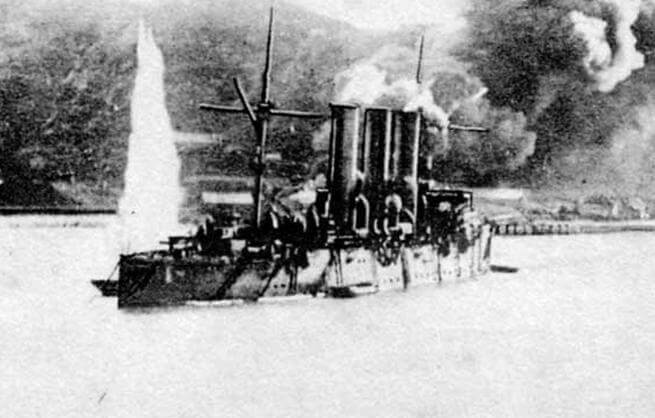
This is a true story of a man who had an amazing ability to foretell the future with an accuracy of more than 95%.
In 1903, Nao Deguchi (1836-1918), the founder of Oomoto religion of Japan, predicted the outbreak of the Russo-Japanese war by automatic writing.
Nao Deguchi (1836–1918)
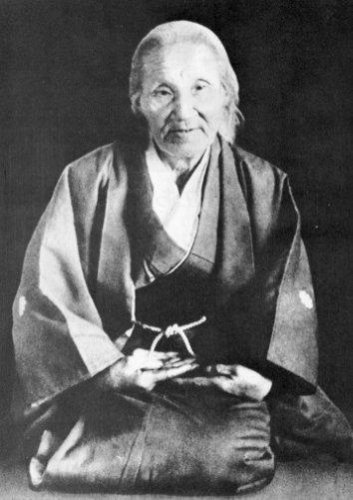
One day, Nao was possessed by Shinto God, “Ushitora no Konjin (Golden God of Northeast)”.
Then, Nao began to predict the future by automatic writing using a writing brush.
Her prediction was called as Ofudesaki.
Amazingly, several years before, Nao had predicted that the Sino-Japanese War would break out.
This prediction actually came true.
Thus, Nao became known as a respected psychic medium in Japan in the early 1900s.
If you are interested in Nao’s amazing experience of being possessing by Golden God, please click the link below.
Amazing God’s Prediction of the Russo-Japanese War
In 1893, Golden God gave Nao the prophecy of the outbreak of the Russo-Japanese War as follows.
I already informed Deguchi Nao in 1893 that a great war would break out from Russia.
God is planning to give Japan a victory in the war.
The words of Shinto God, Ushitora no Konjin (Golden God of Northeast) written by automatic writing.
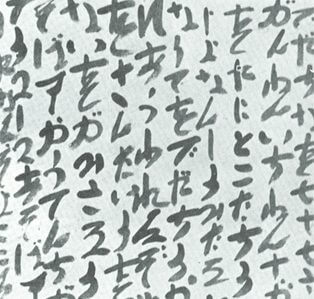
Rising Tension between Russia and Japan
In 1899, six years after the above prophecy, a violent anti-foreign uprising took place in China by the Militia United in Righteousness (Yihetuan) to oppose to Western colonialism and the Christian missionary activity.
Since many of the members of Yihetuan had been practitioners of Chinese martial arts (Chinese Boxing), they were called as “Boxer” and this uprising as “the Boxer Rebellion”.
A Boxer during the revolt. They were armed with rifles and swords and claimed supernatural invulnerability towards blows of cannon, rifle shots, and knife attacks.
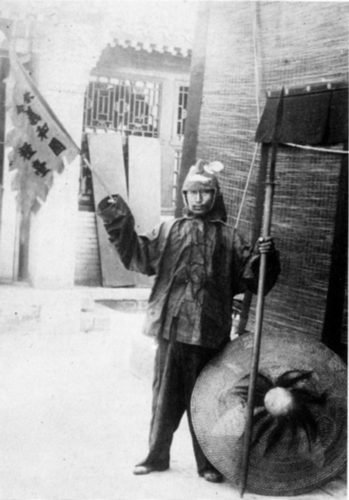
Several months after, the participants of the Boxer Rebellion converged on the Chinese capital, Beijing with the slogan “Support the Qing government and exterminate the foreigners.”
The Empress Dowager Cixi supported the Boxers and on June 21, she issued an Imperial Decree declaring war on the foreign powers.
Empress dowager of Qing (1835-1908)
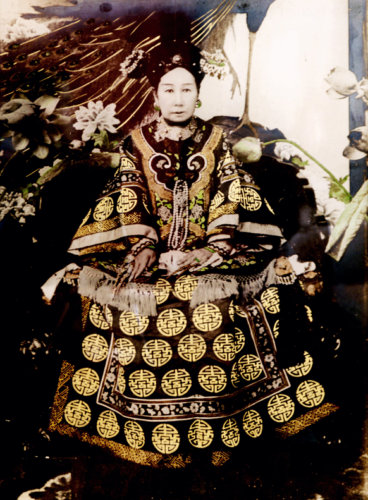
In order to quell the Boxer Rebellion and to relieve the international legations under siege in Beijing, the Russians and the Japanese both contributed troops to the eight-member international force sent in 1900.
Russia had already sent 177,000 soldiers to Manchuria, nominally to protect its railways under construction.
Russian officers in Manchuria during the Boxer Rebellion.
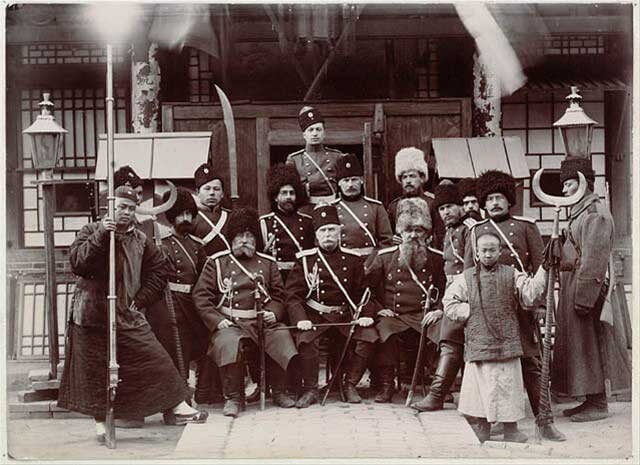
Japanese marines who served in the Seymour Expedition.
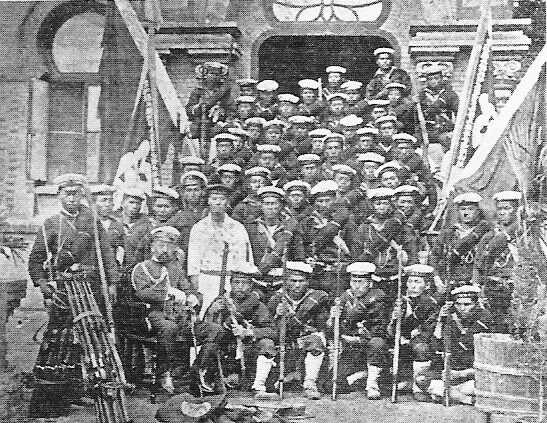
The Eight-Nation Alliance brought 20,000 armed troops to China and defeated the Imperial Army, and arrived at Peking on August 14, relieving the siege of the Legations.
After the Boxer Rebellion, 100,000 Russian soldiers were stationed in Manchuria.
The Russian troops settled in and they had actually strengthened their position in Manchuria, causing the Japanese much anxiety.
Under such a situation, the relations between Russia and Japan was strained to the breaking point.
Japanese Psychic’s Prophecy of the Russo-Japanese War
On 18, April 1901, Deguchi Onisaburo , a spiritual leader of Oomoto visited Katsutate Nagasawa, a Shinto priest of Yamanashi shrine in Shizuoka, Japan.
Deguchi Onisaburo (1871-1948), the greatest psychic of Japan in the early 1900s.
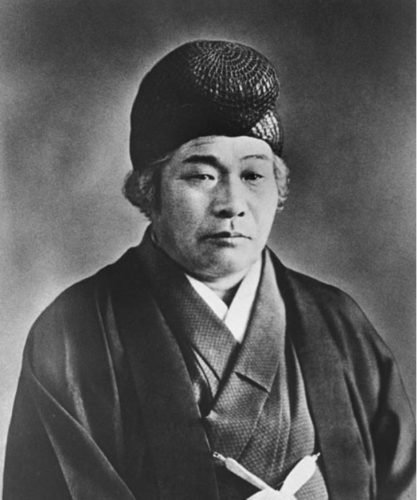
Nagasawa intended to invoke a Shinto God to possess Onisaburo and to ask God the future relation between Russia and Japan.
Nagasawa and Onisaburo washed hands and rinsed mouth.
Then, they sat face to face before the Yamanashi shrine.
After confirming that Onisaburo was possessed by God, Nagasawa asked him the future relation between Russia and Japan.
The following is the conversation between Nagawasa and Onisaburo.
Nagasawa:
Will a war between Japan and Russia break out?
Onisaburo:
Yes, it will.
When will it break out?
This year?
On August this year.
But it will be postponed until February 1904.
The war mood will grow from July 1903.
And the war will break out in February 1904.
Will Japan be able to win this war?
Yes, Japanese will gain a series of victories.
But, seven warships will sink and many soldiers will lose their lives.
So, when will peace come?
Peace will come by September in the second year of war.
The above questions and answers lasted for about two hours.
According to Nagasawa, the divine spirit which possessed Onisaburo at that time was God of a Shinto shrine “Iwashimizu Hachimangū” in Kyoto.
Iwashimizu Hachiman Shrine, Kyoto, Japan.
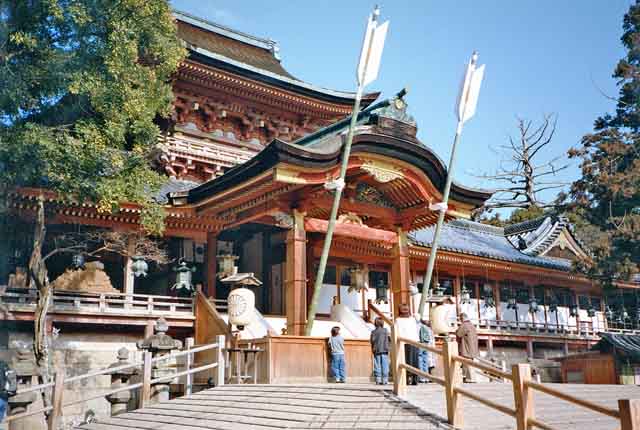
Onisaburo answered to Nagasawa’s question in details from the Russia’s plan of operations to the diplomatic negotiations between Russia and Japan.
Amazingly, Onisaburo answered fluently as if he was actually watching the future.
Fulfilled prophecy of the Russo-Japanese War
In the above prophecy, Onisaburo predicted that the war mood will grow from July, 1903.
Actually, the Russians acquired mining and forestry concessions near the Yalu and Tumen rivers, and then they demanded the lease of Ryongamp’o in Korea in July 1903, which created a backlash in Japan.
Greater Manchuria. Russian (outer) Manchuria is the lighter red region to the upper right.
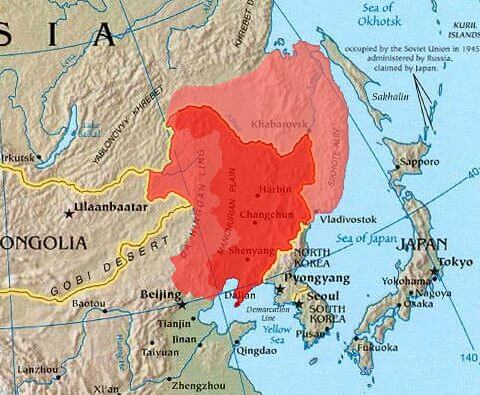
At first, the Japanese statesman, Hirobumi Itō (1841-1909) started to negotiate with the Russians, because he regarded Japan as too weak to evict the Russians militarily.
Hirobumi Itō (1841-1909), the President of the Privy Council of Japan
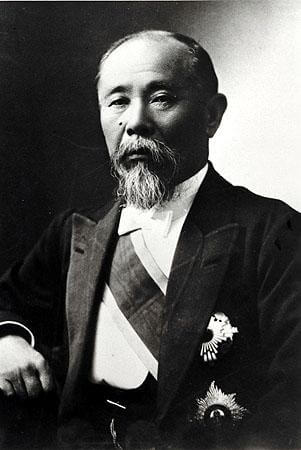
However, the Japanese government realized that Russia was not interested in the Japanese proposal.
Tsar Nicholas II of Russia held the Japanese in contempt as “yellow monkeys”, and he took for granted that the Japanese would simply yield in the face of Russia’s superior power.
Nicholas II (1868-1918), Emperor of Russia. He was convinced that Russia would win.
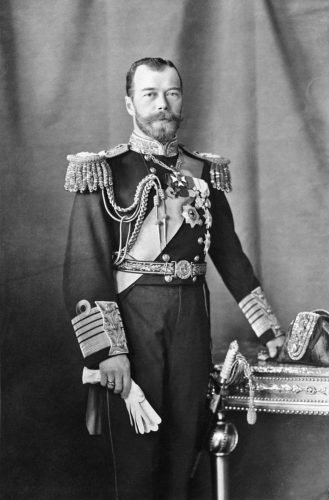
Then, on October 3, 1904, Russia presented to the Japanese government the counterproposal, which was not acceptable to Japan.
As a result, on February 6, 1904, Japan severed deplomatic relations with Russia and then on 8 February, Japan issued a declaration of war.
Thus, the Russo-Japanese War broke out on February, 1904, just as Onisaburo predicted.
Contrary to the expectation of Nicholas II, Russia suffered multiple defeats by Japan and the Russians were forced into suing for peace.
Russian cruiser Pallada under fire at Port Arthur
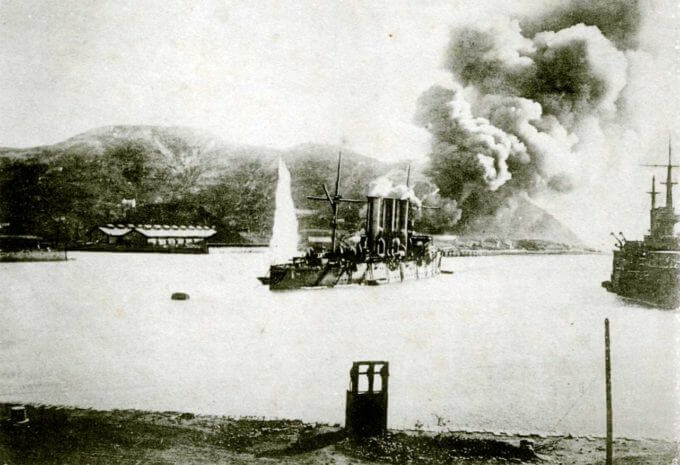
On the other hand, the Japanese Army suffered heavy casualties.
The number of Japanese Army dead in combat or died of wounds is put at around 59,000 with around 27,000 additional casualties from disease, and between 6,000 and 12,000 wounded.
Japanese assault on the entrenched Russian forces, 1904
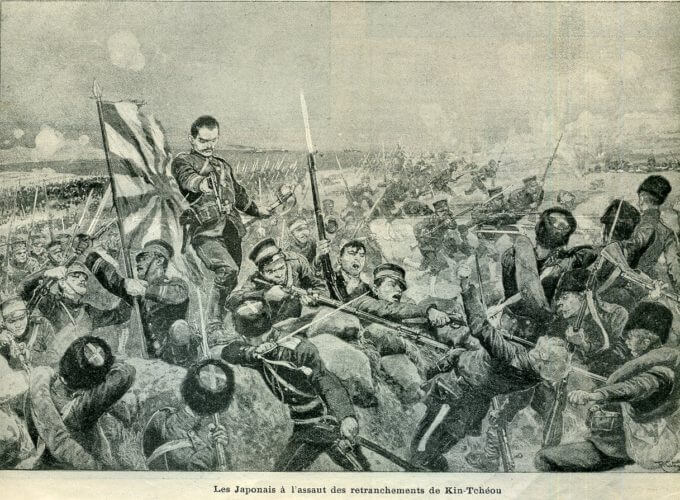
Finally, Russia was force to accept a humiliating peace and the war concluded with the Treaty of Portsmouth on September 5, 1905, mediated by US President Theodore Roosevelt.
Negotiating the Treaty of Portsmouth (1905)
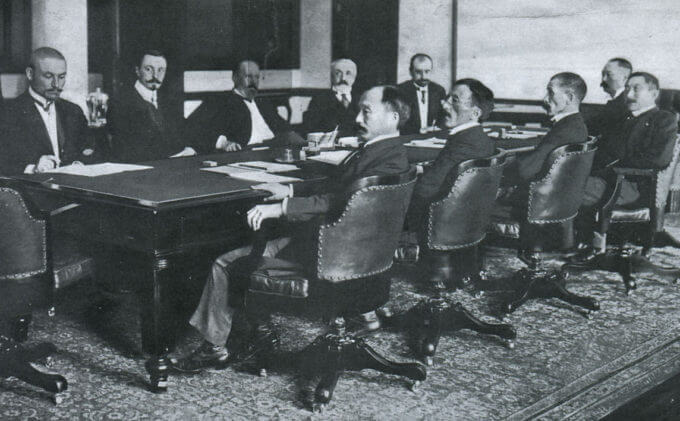
Theodore Roosevelt (1858-1919)
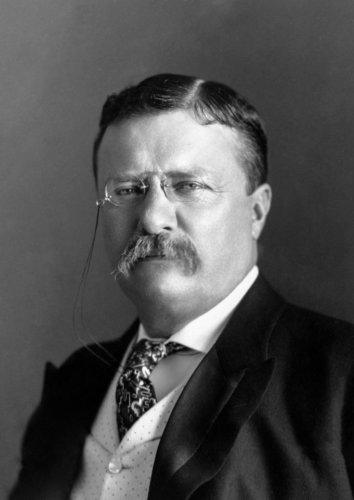
In this way, the peace came by September in the second year of the Russo-Japanese War, just as Onisaburo predicted.
Unfulfilled Prophecy of the Russo-Japanese War
By the way, Onisaburo predicted that the seven Japanese warships would sink.
However, this prediction was not fulfilled.
Actually, the losses of the Imperial Japanese Navy through the Russo-Japanese War were 2 Battleships, 1 Coastal Battleship, 4 Cruisers, 7 Destroyers and 1 Auxiliary Gunboat and thus the total warships sunk were 15.
However, except for this inconsistency, Onisaburo’s prophecy was realized with great precision as shown above.
This is the reason why Japanese spiritual researchers say,
Onisaburo’s prediction has an accuracy of more than 95%
In this way, Onisaburo was really a great psychic.
Published on April 30, 2018
Updated on April 24, 2019
Written by OTAKUPAPA
References
- Kyotaro Deguchi (August 30, 2001). “A giant, Onisaburo Deguchi.”
- Kazuaki Deguchi (September 25, 1978). “Prophecies and affirmations of Nao & Onisaburo Deguchi.”
- Sugen Takeda (September 3, 2013). “Warning from the spirit world by Onisaburo Deguchi.”
- Onisaburo Deguchi (December 26, 2002). “Izunome Shinyu.”
- Onisaburo Deguchi (1921-1933) “The story of the spirit world”, Volumes 1 to 81.
- Shinichi Nakaya (August 5, 1993) “The truth of the drastic reform of the universe by Onisaburo Deguchi.”
- Hiroaki Izuka (2007-2018) “Reikai Monogatari Net.”

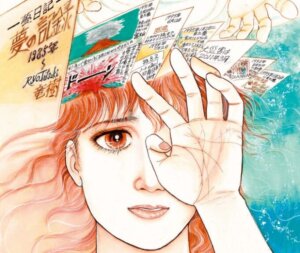
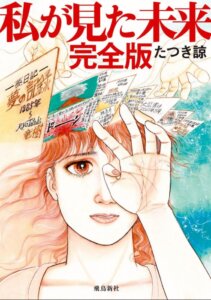
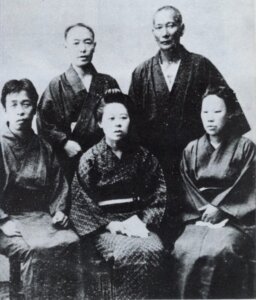

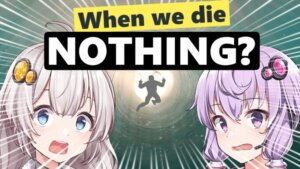
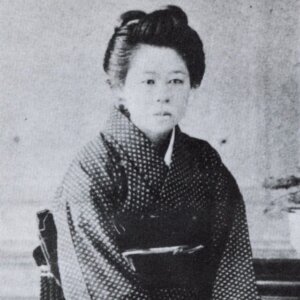
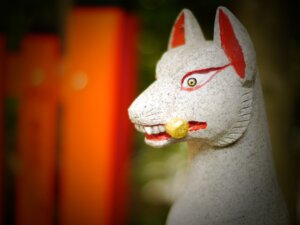
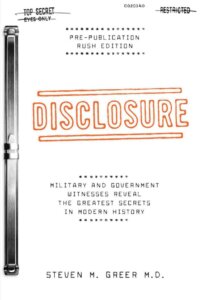
Comments